- Home
- Rebecca Hagan Lee
Talk of the Ton Page 11
Talk of the Ton Read online
Page 11
As for her, Widow Becket was looking up at him and laughing in that perfectly adorable way she had of laughing. It was enough to compel Emily to her feet.
“Wh-where are you going?” Tabitha cried, not quite finished with the recitation of her cousin’s romance.
“I beg your pardon, but I had forgotten that my mother bade me to sit with her.”
“Oh,” Tabitha uttered, obviously bewildered.
“Good day!” Emily said smartly and marched off before Tabitha could reply.
She made her way through the crowd, dutifully stopping to pay her respects where necessary, and finally reaching the other side of the gathering where Montgomery was deep in conversation with Widow Becket. Decorum be damned, Emily marched up to the couple and forced a bright smile to her face.
“Good afternoon, Mrs. Becket. My lord,” she said, curtsying.
Both of them started a bit at her intrusion. Mrs. Becket instantly smiled and grasped Emily’s hand. “Good afternoon, Miss Forsythe! My, how lovely you look today! Positively radiant—it must be the effects of having a successful debut,” she gushed.
“I suppose so. Thank you,” Emily said stiffly, and turned a smile to Lord Montgomery.
“Miss Forsythe, how do you do?” he asked, perfectly polite.
“Very well, indeed, my lord,” she said, and faltered. How to rid Montgomery of the widow now? As it was, the two of them were looking at her expectantly, as if they waited for her to announce something hugely important. “Will you be attending the May Day Ball, my lord?” she suddenly blurted.
Montgomery arched a brow in surprise above his smile. “The May Day Ball? Why, I had not thought of it, Miss Forsythe,” he said, glancing at Mrs. Becket. “I can’t say I’ve even been invited.”
“Of course you have!” Emily insisted. “Everyone has been invited!” She caught herself there and glanced at Widow Becket—well, not everyone had been invited. “I do mean, of course, everyone in the ton.”
Whatever she thought Mrs. Becket’s reaction would be, she had not thought she’d laugh.
“No need to explain, Miss Forsythe. His lordship and I were just speaking of the many events this season holds,” she said and shifted her gaze to his lordship, her smile going very soft for a moment.
“What of them?” Emily asked.
“Beg your pardon?” Widow Becket asked, seeming a little distracted.
“There are many of them for debutantes,” Lord Montgomery helpfully clarified.
“Yes,” the widow said, turning her smile to Emily again. “How fortuitous you have so many places to dance on your first year out!”
“I suppose that is true,” Emily admitted, and clasped her gloved hands tightly together, looked at the stone floor for a moment, wondering why the widow wouldn’t take her leave? A few awkward moments passed. It seemed to Emily to take forever before Widow Becket at last seemed to understand she was intruding.
“Ah . . .” the widow said.
Emily quickly glanced up; Widow Becket smiled very brightly at Emily. “I think I’ve monopolized his lordship quite long enough—”
“But you haven’t at all,” he said instantly.
“I should see if the vicar needs me,” she said, stepping back. “Good day, my lord. Good day, Miss Forsythe.”
“Good day, Mrs. Becket,” Emily called out.
Much to her annoyance, Montgomery’s gaze followed the retreating widow.
“And how did you find the service?” Emily demanded.
Montgomery dragged his gaze to her again. “The service? Inspiring, as always. Aha, there are your parents, Miss Forsythe. Shall I take you to them?”
There was no graceful way to answer that but to say yes, was there? Disappointed, Emily nodded, put her hand on the arm he offered, and let him lead her to where her mother and father were sitting, acutely aware that her opportunity was slipping away from her with each step. Before it slipped completely away, as they neared her parents, she blurted boldly, “I hope I shall see you at the May Day Ball,” and lifted her gaze to him.
Montgomery glanced down at her. “What a lovely compliment. Thank you.” He looked up to her parents. “Mr. and Mrs. Forsythe, how do you do?” he said, lifting Emily’s hand from his arm.
He exchanged pleasantries with them, wished Emily a good day, and walked on, into the crowd.
Emily watched him go, a little bewildered. She’d had it from her very own brother that if a woman paid particular attention to a man, he would reciprocate that attention. Montgomery didn’t reciprocate. He’d scarcely noticed her at all because he was too intent on Widow Becket. It was disgraceful to a man of his stature.
For the remainder of that luncheon, Emily could not tear her gaze from Montgomery, counting the times he looked for Widow Becket. Eight in all.
That afternoon, when they had returned home from that insufferable affair, Emily plotted her revenge on a woman who had the least right of all the women in London to the admiring looks of one of the most eligible bachelors among the ton, a bachelor who, but for some divine intervention, had suddenly become the only man she’d consider marrying.
Widow Becket should enjoy her flirtation now, Emily thought, because she was determined to bring it to a crashing end.
Chapter Four
Emily Forsythe put her carefully devised plan into existence the very next week, when she offered to accompany her mother to the weekly meeting of the Ladies Auxiliary, where the ladies were planning for the Charity Auction Ball.
Her mother was both very surprised and pleased. “Emily!” she said, squeezing her daughter’s shoulders. “How good of you to think of someone other than yourself!” Emily shrugged sheepishly, accepted the offer to wear her mother’s best bonnet in honor, as she happily put it, of Emily’s first step toward benevolence.
The meeting place was an assembly of rooms connected to the church. Only two ladies were present when Emily and her mother arrived. Emily put aside the basket of apples they had brought.
“My daughter joins us today!” her mother announced proudly, and the two ladies exclaimed gleefully at that. Emily smiled and clasped her hands behind her back as she wandered deeper into the room.
She heard a bit of a clatter and turned toward a door at the opposite end of the room as Widow Becket came through it with a tea service. Her gold-red hair was pulled back and knotted at the nape of her neck, and she wore a heavy canvas apron over her drab brown day gown. “Miss Forsythe!” she called happily as she carried the heavy tea service to the table and set it down. “What a pleasure to have you join us!”
Emily gave her a demure nod.
“My daughter is taking her first steps toward charity,” her mother exclaimed for at least the tenth time that day, and beamed at Emily.
“Well! We are very pleased to have you,” Widow Becket averred, and reached out, touched Emily’s arm.
Emily immediately stiffened; Widow Becket seemed to feel that she did and withdrew her hand, pushed a strand of hair behind her ear, and with a small, self-conscious smile, busied herself with the tea service. “The vicar has sent tea for our meeting this morning,” she announced to them all. “He avows it is the finest tea yet to reach England’s shores.”
The ladies tittered at that; Widow Becket wiped her hands on her apron. “I’ve some biscuits in the oven. I’ll just fetch them—”
“May I help you, Mrs. Becket?” Emily quickly interjected, trying very hard to ignore her mother’s proud smile.
The widow glanced up from the tea service, eyed her suspiciously. But in the next moment, she said, “I should appreciate all the help that is offered.” She flashed another warm smile—one that made Emily shiver. “Come, Miss Forsythe, and I will show you our kitchen.”
Emily put her hand into the widow’s and walked stiffly beside her through the door and down a long row of stairs into the church’s kitchen. Emily had not known before today that the church even had a kitchen, but as Widow Becket explained, upon seeing her look of confusi
on, the very large churches usually had one tucked away to assist in such activities as charities and wedding breakfasts and so forth.
Widow Becket walked to the oven and pulled it open, and with a thick towel, she removed a tin of biscuits and put them on the wooden table that stretched almost the entire length of the kitchen. She returned to the oven and removed a second tin and placed it beside the first. With an iron spatula, she began to remove the biscuits from the tin and put them on the table to cool, and smilingly gestured for Emily to do the same with the first tin.
“Have you ever been to the Malthorpe Orphanage?” Widow Becket asked as they worked.
“No, mu’um.”
“We thought to pay a call after we finish our work here. I think you will find the children delightful.”
Emily had not given any thought at all to what they actually might do at this meeting, and really, it hardly mattered at the moment, as she was deeply racking her mind for a way to broach the subject she so desperately wanted to broach. “Where do the children come from?” she asked idly, more in an attempt to hide the fact that her mind was elsewhere.
“I’m not entirely certain,” Widow Becket said thoughtfully. “Some of them have lost their parents. Others are wards of the church . . .” Her hand stilled; she looked up, as if she was seeing something far away. “I suppose their mothers have chosen a life not suitable for children,” she said softly and resumed her work with the biscuits. “They are women who must, for whatever reason, indulge in the most ignoble of human conduct.”
Upon hearing that, Emily inadvertently broke a biscuit in two. “Ah,” she said, nodding slowly. “You mean the sort of woman Lord Montgomery consorts with.”
Her remark certainly had the desired effect; Widow Becket’s head snapped up, and she looked at her in astonishment. “I beg your pardon?”
Emily quickly lowered her gaze and continued to carefully slide the biscuits from her tin onto the wooden table. “I don’t mean to be uncouth, Mrs. Becket, truly I don’t. But . . .” She let her voice trail away, a trick she had learned from her mother, who often left the most important part of her speech dangling when she wanted her husband’s full attention.
“But?” Mrs. Becket asked.
Emily looked up and winced as if she were pained by something so vile. “It’s true. I daresay I had the misfortune one night, returning from the theater with my cousin, of seeing him on the street in their company. And once, I overheard my father speaking with a gentleman friend,” she said, lowering her voice to a coarse whisper, “and he said that Lord Montgomery would do well to keep his lady friends in the alleys where they belonged.”
Something flit across Widow Becket’s face, but then . . . nothing.
Once again, she surprised Emily—she did not seem the least bit offended. She did not gasp, did not make any sound at all, but went on shoveling biscuits onto the wooden table as if she’d not heard a word Emily had said. In fact, Emily worried that perhaps she hadn’t heard her, and leaned forward, peering up into her face. “You do understand me, Mrs. Becket?”
“Of course I do, Miss Forsythe,” she said, and smiled as she walked past Emily to put her tin away.
Was it possible the widow did not understand the implications of what she’d just said? “I suppose that’s why his lordship has the awful reputation of being a roué,” Emily mused aloud. “It’s said in all the drawing rooms, you know.”
“No, I wasn’t aware,” Widow Becket said pleasantly, as if they were discussing the weather. “There now,” she continued, arranging two of the biscuits just so. “I shall return in a quarter of an hour and they should be quite cool to the touch. Shall we go help the ladies with the charity baskets?”
Bewildered by Widow Becket’s reaction—or lack of it—Emily nodded and followed her out.
She did not have another opportunity to reassure herself that Mrs. Becket understood Lord Montgomery’s dark reputation but consoled herself with the knowledge that what little she had said most certainly dampened Widow Becket’s enthusiasm for him. After all, how could she possibly continue to esteem him, her being a vicar’s widow and he being a bloody rake, for God’s sake?
All right, then, the part about the ladies and the alleys had been completely fabricated, but everyone in town knew that Lord Montgomery was no stranger to the pleasures of female flesh. And now, the saintly Widow Becket knew it, too.
Still . . . to be doubly sure that Widow Becket was completely out of the picture, Emily begged her leave of paying a call to the orphanage, much to her mother’s obvious disappointment, and instead paid a call to Lady Southbridge.
Lady Southbridge was a grand dame of the ton. It was said—at least by Emily’s father—that if there was anything worth knowing about a person, Lady Southbridge knew it and would repeat it to one hundred of her dearest friends. Emily certainly hoped that was true.
Lady Southbridge was pleasantly surprised to see Emily when the butler showed her to his lady’s drawing room. The large old woman was lounging on a day couch, two little dogs at her feet.
“Miss Forsythe!” she cried happily as Emily curtsied before her. “Forsythe has turned you out quite well, hasn’t he? Turn round, turn round, and let me have a look at you.”
Emily did as she was told, and when she had completed her rotation, she smiled sweetly at Lady Southbridge and dropped another curtsy.
“Oh my, you’re a lovely one, dear. So come,” she said, patting the seat of the chair next to her. “Come and tell me all about your coming out. Have you received any offers?”
“None,” Emily said.
“Dunn?” Lady Southbridge squealed.
Emily’s eyes flew wide open—Lord Dunn, the positively ancient old man? “No!” she said instantly. “No, no, I beg your pardon, I said none.”
“Well then, you must not mumble, Miss Forsythe, for I distinctly heard you say Dunn.”
Emily blinked several times. “Forgive me,” she muttered.
“Oh, of course, of course,” she said, clearly disappointed that Emily’s answer was not Dunn. But she quickly recovered. “Oh there now, you mustn’t be unhappy, Miss Forsythe! It’s quite early yet! Why, in my day, a gentleman did not dare offer for a young lady before the Charity Auction Ball! It makes a young man seem far too eager if he offers before then.”
“Really?” Emily asked, perking up.
“Oh, indeed!” Lady Southbridge cried, and with two hands, patted her enormous chest. One of the little dogs scampered up the hill that was her and happily licked her face. “The Charity Auction Ball is still the venue for the most important offers,” Lady Southbridge continued, giggling at her little dog as she took him in her arms and crushed him to her. “So, my dear, what brings you to my sitting room today?” she asked, oblivious to the little dog’s squirming.
“Only my desire to call on you, my lady. My mother speaks so very highly of you, and I had always thought that when I’ve come out, I shall go and pay my respects to Lady Southbridge.”
Lady Southbridge smiled broadly at that, her cheeks balling up like two lumps of dough. “What a thoughtful dear you are!” she cried. “When who comes out?”
“When I’ve come out,” Emily said again, but louder.
“Really, you must practice your enunciation, Miss Forsythe. You’ve an awful habit of mumbling! Oh, I adore callers, and you are the perfect antidote to an otherwise dreary afternoon! I’ll just ring for tea,” she said and picked up the little bell next to her day couch.
The sun was shining for the first time this week, but Emily smiled nonetheless and put her hands in her lap as Lady Southbridge rang for her butler.
They chatted over tea, gossiping about all the debutantes, with Emily professing a dislike for most of them. Lady Southbridge was accommodating in that—if Emily professed a dislike for another debutante, her ladyship was quick to offer up a juicy little tidbit about the offending young woman.
But when Emily had been in her company for three-quarters of an hour, she was
growing desperate to plant the next seed to detach Montgomery from the widow. Fortunately, Lady Southbridge gave her the opening she needed.
The old woman was really something of a remarkable windbag, and she was droning on and on about someone, a friend’s sister by marriage, some such relation, and that she’d done the most awful thing by consorting with a high-ranking official in the House of Commons. “Her reputation is ruined,” Lady Southbridge said with disgust as she examined the biscuits. “She shan’t show her face in London again, mark me. It was all really quite scandalous,” she said with a shake of her head as she selected another biscuit.
“I should think not as scandalous as consorting with a vicar’s wife,” Emily quickly interjected.
“Eh? What’s that?” Lady Southbridge asked, her head snapping up so quickly that Emily briefly feared she might choke on the biscuit she’d just shoved in her mouth.
“I said, I should think not as scandalous as a vicar’s wife!” Emily shouted.
“For goodness sake, I heard you, dear! What I mean to understand is which vicar’s wife?”
“Oh,” Emily said and coyly sipped her tea. “I shouldn’t have uttered a word, Lady Southbridge. I’m certain I’m quite wrong, and I should just as soon cut out my tongue as speak ill of anyone—”
“Yes, yes, but who?” Lady Southbridge insisted.
Emily put her teacup down. “All right then. But please, you must give me your word you won’t repeat what I’m to say to another living soul.”
That earned a groan and a roll of Lady Southbridge’s eyes as she fell back against her day couch. “I should be insulted, were I not as old and wise as I am, for I am hardly the sort to wag my tongue!” she exclaimed heatedly.
“I beg your pardon; I never meant to imply that you were, mu’um. It’s just that . . . it’s so scandalous, that I scarcely believe it, and I should perish away if anyone were to credit me with having suggested anything so morally despicable!”

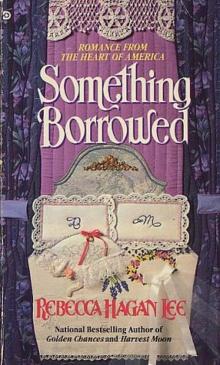 Something Borrowed
Something Borrowed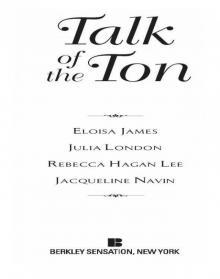 Talk of the Ton
Talk of the Ton Golden Chances
Golden Chances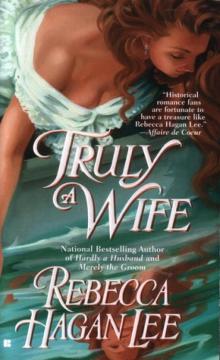 Truly a Wife
Truly a Wife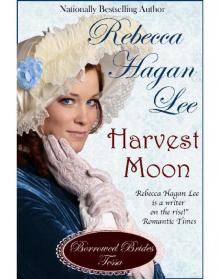 Harvest Moon
Harvest Moon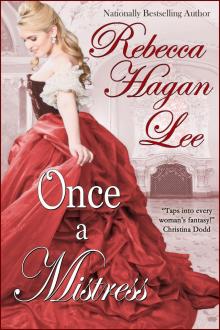 Once a Mistress
Once a Mistress Gossamer
Gossamer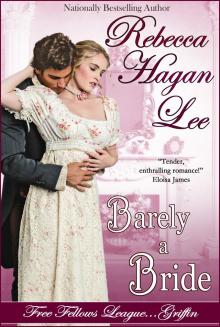 Barely a Bride
Barely a Bride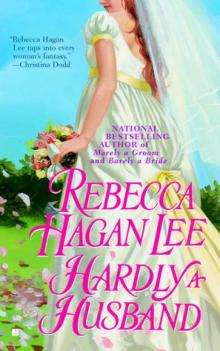 Hardly a Husband
Hardly a Husband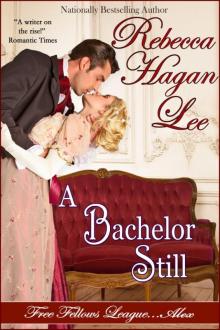 A Bachelor Still
A Bachelor Still A Wanted Man
A Wanted Man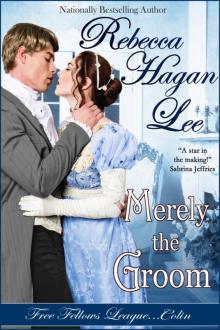 Merely the Groom
Merely the Groom Whisper Always
Whisper Always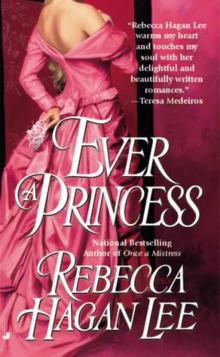 Ever a Princess
Ever a Princess A Hint of Heather
A Hint of Heather